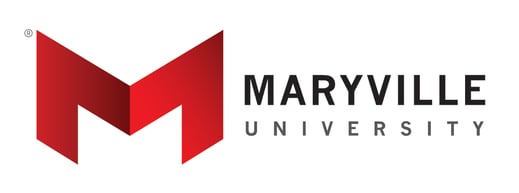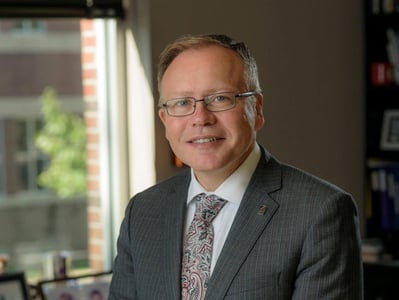
March 12 2019
Maryville’s Vice President for Integrated Marketing and Communications Marcia Sullivan characterizes their approach to students in the following way: “We are loyal to our students above all history, tradition, pedagogy, and comfort.”
At the most strategic levels, the entire institution is geared toward improving student outcomes inside and outside the classroom. In order to accomplish the strategic plan and to create a culture of continuous innovation in and outside of the classroom, Maryville looked carefully at teaching and learning, and in partnership with Apple, built an Active-Learning Ecosystem (A.L.E.) around three interlocking components: life coaching, learning design, and the digital world.
The A.L.E., developed initially in 2014 and continually evolving and growing, is predicated on the fundamental assumption, which we’ve discussed here, that all students learn and process information differently and thus require personalized learning facilitated by the most relevant technology. Applied learning embedded in the A.L.E. means a student’s knowledge of a subject is based on their ability to apply what they know and understand in order to address real problems in that field. If students can grasp and apply the elements of basic psychology, why should they spend a year taking the two-course sequence of Psych 101 and 102?
The central key to the A.L.E. is that the pace of learning must be self-determined, not artificially divided into eight semesters over four years. It is a model that takes the core principles of the Montessori experience and merges them with the latest in learning diagnostics and technology to free students and their faculty facilitators in ways the old format has not done and could not do.
Maryville’s A.L.E. uses learning diagnostics and learning theory to build intricate profiles on all traditional undergraduate students, showing how and why they learn the way they do. Utilizing those profiles, faculty members partner with learning designers to create curriculum and robust learning content that connects with students on a one-to-one level. The facilitative tool or delivery system for this instruction is the iPad, which opens up multiple resources and learning approaches in the same space and time.
Maryville launched its Digital World initiative in partnership with Apple in 2015. The paradigm shift around digital learning was adopted initially by what Maryville calls their pied pipers: a small group of visionary faculty and learning designers who developed an approach rooted in learning theory, based on personalized instruction, and focused on problem-solving, which they then took campus-wide through training and facilitation. Students are told that Digital World classes represent “a collaboration between learner and professor. All of the world’s information is just one online search away, so our professors are adapting the way they teach. Digital World classes will have you working together with professors and your fellow students to tackle real-world challenges … which is ideal preparation for the job that awaits you after graduation.”
Faculty at Maryville have embraced the Digital World initiative and say that it has been a game-changer for how they teach. For example:
- Professors for introductory science courses—content-heavy, challenging classes—rely on feedback from adaptive-learning software to tailor course content to help more students effectively master the topics at hand.
- In a literature class, students use their iPads to create their own children’s literature to take into their practicum classrooms and read to their own students, in turn teaching young learners how to create and publish e-books.
- The high levels of engagement around the Digital World initiative led to the development of an application-development minor, which is open to students in any major, in order to allow them to build coding and development skills.
Today, more than four thousand iPads are deployed to all undergraduate students, faculty, and a cadre of adjuncts, and the new pedagogy has taken hold. One faculty member says, “The future of iPads in the classroom at Maryville is tremendous. We are putting students in a place where they can be the creative innovators for tomorrow.”
How are you affecting student learning environments and outcomes on your campus? Check out some of the great Student Success work Credo engages in, like our signature retention service, Moving The Needle, to find out how we can empower your campus's student success and retention numbers.
Are you enjoying this blog series? If so, you can get the complete text behind the blog by ordering "PIVOT: A Vision for the New University." Go beyond excerpts and get the full story by ordering your copy today!
© Credo and www.credohighered.com, 2018. Unauthorized use and/or duplication of this material without express and written permission from this site’s author and/or owner is strictly prohibited. Short excerpts and links may be used, provided that full and clear credit is given to Credo, Credo Press, and www.credohighered.com with appropriate and specific direction to the original content. Please email info@credohighered.com for information on how to obtain a full copy of Pivot: A Vision for the New University or for permission to use excerpts from the book and/or blog series.
Related Blog Posts
Recent Posts
- Richard Dunsworth, J.D., To Receive 12th Annual Courageous Leadership Award December 16 2024
- Meet the 2024 Credo Values Award Recipients August 27 2024
- What is Executive Coaching, Really? June 25 2024
- Credo & The Constructive Dialogue Institute Announce A New Partnership For Higher Education Leadership Development March 7 2024
- Celebrating Women And Gender-Diverse Learners & Leaders February 28 2024
Categories
- Strategy
- Leadership
- Student Success
- Student Success & Retention
- Enrollment
- Pivot
- Strategic Planning
- Leadership Development
- News
- Strategic Enrollment
- Campus Planning and Architecture
- Moving the Needle
- Data
- Research
- Retention
- Campus Master Planning
- Enrollment & Financial Aid
- Academic Programming
- Campus Planning
- Thriving
- Admitted Student Research
- Architecture
- Finance
- Advising
- Admissions




